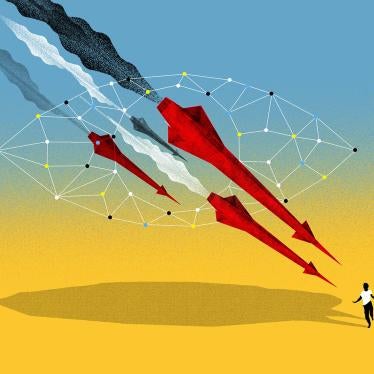The Ethiopian government should end its harassment of an association of independent journalists that has frequently criticized the government's repression of the independent press, Human Rights Watch said today in a letter to Ethiopia’s prime minister.
The Ethiopian Free Journalists Association (EFJA), a group composed of journalists associated with the country’s beleaguered independent press, has come under government attack in recent months for opposing a proposed press law that would tighten government oversight of news reporting.
“The Ethiopian government is trying to muffle the independent press,” said Peter Takirambudde, Executive Director of Human Rights Watch’s Africa Division. “The government’s harassment of the Ethiopian Free Journalists Association violates the freedoms of expression and association.”
In November, the Ethiopian Ministry of Justice canceled EFJA's registration as a private voluntary organization on charges that group had failed to file financial reports. This cancellation of registration prohibited the association from continuing to operate. A few weeks before the cancellation, Minister of Information Bereket Simeon accused the EFJA of undermining "responsible journalism" by opposing a government bill to regulate news reporting.
In the months preceding the ministry's cancellation of the association’s registration, the EFJA made serious efforts to supply financial information required by Ethiopian law, but the government claimed that the organization had never provided the data. The registration cancellation occurred shortly before a chartered accountant engaged by the organization could complete his audit.
Last month, while the EFJA was prohibited from transacting business, the government convened meetings of the organization to replace the group’s executive committee, which had opposed the government’s proposed press law. The government's interference in the internal affairs of a private organization was politically motivated and in violation of the right to freedom of association and expression guaranteed under international human rights law, Human Rights Watch said in its letter to Ethiopian Prime Minister Meles Zenawi.
The private press in Ethiopia leads a precarious existence. Reporters, editors and publishers are frequently arrested and convicted for criminal defamation and disseminating false information on the basis of articles they have written or published. The proposed law retains criminal sanctions for the press's failure "to investigate the correctness of the news that it publishes." It requires publications to be registered and licensed and gives the government power to withhold or withdraw registration and licenses. The bill also allows the government to censor articles based on foreign sources whenever it deems that an article endangers peace, security or patriotism or contains "false accusations" against government officials and agencies.
The government's revocation of EFJA's registration and its active participation in the selection of new leadership for the group appears to be an effort to intimidate the entire press corps and those opposed to the proposed law, Human Rights Watch said.






